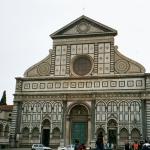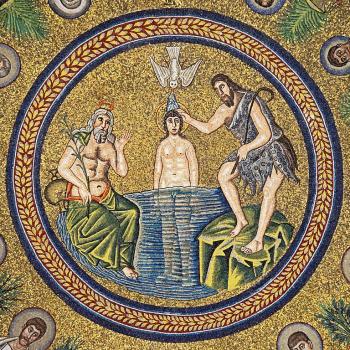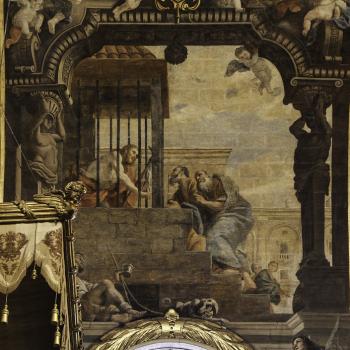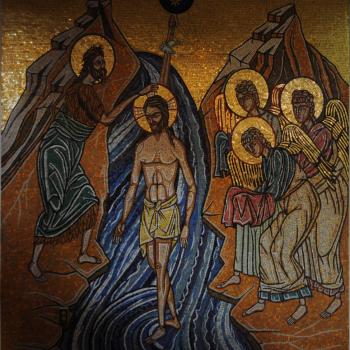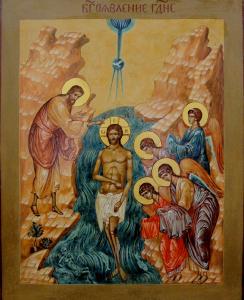
Each of the persons of the Trinity reveal themselves at Jesus’ baptism. God the Son, the incarnate Logos, was baptized, not because he needed to be baptized by John, but because the world needed his baptism. “For the Word was not baptized stripped of a body, but received baptism having truly become flesh; the Word was baptized for the sake of us men, in order that, having purified our nature and the waters, He might make our salvation perfect.”[1] The Holy Spirit’s presence was made known when God the Father spoke, revealing the fact that Jesus is God’s Son (and that, therefore, there were three members of the Trinity):
Then Jesus came from Galilee to the Jordan to John, to be baptized by him. John would have prevented him, saying, “I need to be baptized by you, and do you come to me?” But Jesus answered him, “Let it be so now; for thus it is fitting for us to fulfil all righteousness.” Then he consented. And when Jesus was baptized, he went up immediately from the water, and behold, the heavens were opened and he saw the Spirit of God descending like a dove, and alighting on him; and lo, a voice from heaven, saying, “This is my beloved Son, with whom I am well pleased” (Matt. 3:13-17 RSV).
While the event is usually depicted with the Holy Spirit being represented by a dove, we must keep in mind that the text itself only said that the Spirit descended like a dove, not that it was a dove. However, because of this, it is fine to imagine the Spirit, to symbolize it, with a dove, as it helps us understand that, in a way, the Spirit is said to “descend” upon us when in takes us in and shares with us the holiness and grace of God.
The feast of the baptism of Christ, because of the way it presents to us the persons of the Trinity, is called the Theophany in the East. Each person of the Trinity has their own special appearance at the event, and in a way which transcended all previous theophanies, all other ways God could be seen to make an appearance in world history. This is because at Christ’s baptism, the Trinity is much more directly connected and active, while in previous theophanies, God mostly used creaturely subjects to indirectly represent the Godhead to the world (in a way which was much more nebulous and sometimes hard to tell if it were God or an angel which was present).
It is important for us to recognize that God chose this specific event to give us the revelation of the Trinity. ‘Every manifestation of God to man (theophany) bears the imprint of the circumstances in which it was given, especially by the national character of the people who received it.”[2] There are many ways in which God can be made known to the world, but there is only one time and place in which we find God becoming human, taking on human nature, becoming a part of human history: in ancient Israel. God gave Israel a special charism, one which grew sharper with the prophets, and which came to its greatest height in the person of St. John the Baptist; that charism was both to be the specially chosen people of God in which the incarnation would take place, but also to present to the world, thanks to its special relationship with God, the God-man. This is exactly what John did when Jesus was baptized. He took his prophetic authority and highlighted the glory of Jesus, saying that he was not worthy on his own to do what Jesus asked of him. Jesus, however, said, it was right for John to baptize him, and in this way, also confirmed that it was right for Israel to be chosen to bring the God-man to the world. John, in this way, represents the glory which was given to Israel; he was able to hand off the messiah to the world, so that the messiah, the God-man, can then take center stage. And, in doing so, we are shown, moreover, how salvation truly from the Jews, because salvation history is intertwined with Israel, and Jesus, the God-man, found it necessary to both honor Israel (in coming to John) but also to begin to share with the world the glory of the Holy Spirit at his baptism:
but when the goodness and loving kindness of God our Savior appeared, he saved us, not because of deeds done by us in righteousness, but in virtue of his own mercy, by the washing of regeneration and renewal in the Holy Spirit, which he poured out upon us richly through Jesus Christ our Savior, so that we might be justified by his grace and become heirs in hope of eternal life (Titus 3:4-7 RSV).
John preached repentance, while Jesus was able to present to those who followed through with such metanoia the grace they needed for their salvation. John reminded us all that we need to strive to do better, while Jesus gave us what we needed so that our striving can be fulfilled. Without grace, the grace brought to the world in the incarnation, and in the baptism of Jesus, we would be stuck in a rut, trying to attain a level of perfection which the wounds of sin had made impossible.
It is God’s mercy and love which serves as both as the foundation for our creation as well as our recreation. This mercy and love was revealed, in a unique way, at Jesus’ baptism, for we are shown God is at work amongst us despite our sin and the way we had abandoned God and the way of love. John serves to point the way forward, and Jesus came to John to make sure that the way to which John pointed could be traversed. With the Holy Spirit descending upon Christ, and through Christ, to the world, we now are able to cooperate with the prompting of the Spirit, to not only repent, but to open ourselves up to the grace which has been offered:
For the grace of God has appeared for the salvation of all men, training us to renounce irreligion and worldly passions, and to live sober, upright, and godly lives in this world, awaiting our blessed hope, the appearing of the glory of our great God and Savior Jesus Christ, who gave himself for us to redeem us from all iniquity and to purify for himself a people of his own who are zealous for good deeds (Titus 2:11-14 RSV).
We must be zealous, in the proper sense, for holiness; if we love that which is good, we will do what we can to embrace that good. We might be weak. We might need help. We might need grace. But we should not use such weakness as an excuse to ignore our own role, to work out our salvation with fear and trembling. We must repent. We must strive for true holiness, a holiness which is not found merely by engaging private acts of piety, but the holiness found in love, that is, a holiness found in deed, When we do so, we will find God appearing in our life, taking us by the hand, helping us transcend ourselves.
[1] St Sophronios of Jerusalem, “Homily 3: Homily on the Holy Baptism” in Homilies. Trans. John M. Duffy (Cambridge: Harvard University Press, 2020), 89.
[2] Vladimir Solovyey, God, Man & The Church. The Spiritual Foundations Of Life. Trans. Donald Attwater (Cambridge: James Clarke & Co., 2016), 65.
Stay in touch! Like A Little Bit of Nothing on Facebook.
If you liked what you read, please consider sharing it with your friends and family!
N.B.: While I read comments to moderate them, I rarely respond to them. If I don’t respond to your comment directly, don’t assume I am unthankful for it. I appreciate it. But I want readers to feel free to ask questions, and hopefully, dialogue with each other. I have shared what I wanted to say, though some responses will get a brief reply by me, or, if I find it interesting and something I can engage fully, as the foundation for another post. I have had many posts inspired or improved upon thanks to my readers.


